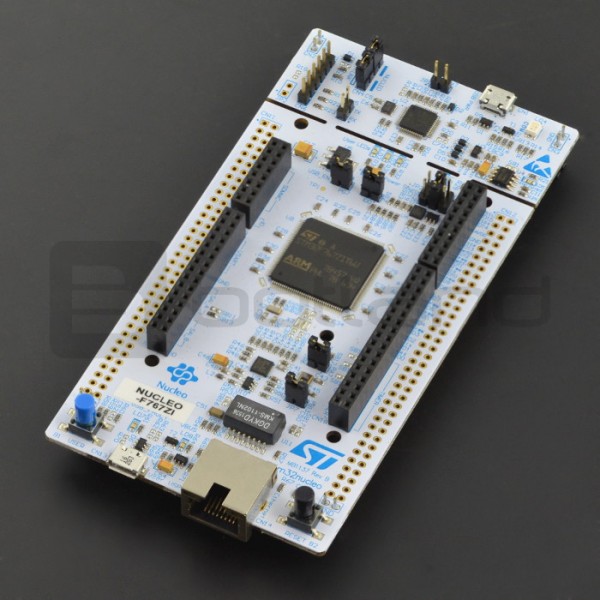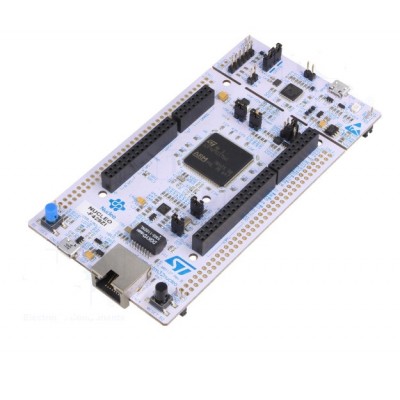

Under Categories > Middleware, select USBDEVICE. You should see PA11 and PA12 be automatically configured for USBDM and USBDP. Please note I have commented out the Ethernet Init due to the expected hard. In the Pinout & Configuration tab, go to Categories > Connectivity and click USB. I have added these lines to main.c to blink the LED. Using CubeMX I have configured the board using the default pinout. You can find more details on the available pins and labels in the PeripheralPins.c and PinNames.h files. I am trying to blink the three LEDs on the board, but the LEDs are not blinking. Mass storage (USB Disk drive) for drag'n'drop programming.2 3 Updated Table 1: Device summary, System requirements to add NUCLEO-F412ZG. 2 2 Updated: Features, Table 1: Device summary, System requirements to add NUCLEO-F767ZI. Document revision history Date Revision Changes 2 1 Initial version. The STM32 Nucleo-144 boards based on the MB1137 reference board (NUCLEO-F207ZG, NUCLEO-F303ZE, NUCLEO-F412ZG, NUCLEO-F413ZH, NUCLEO-F429ZI, NUCLEO- F439ZI, NUCLEO-F446ZE, NUCLEO-F722ZE, NUCLEO-F746ZG, NUCLEO-F756ZG, NUCLEO-F767ZI, and NUCLEO-H743ZI) provide an affordable and flexible way for users to try out new concepts and build prototypes wit. USB re-enumeration capability: three different interfaces supported on USB Revision history NUCLEO-XXXXZX 4/5 DocID028659 Rev 6 Revision history Table 4.USB VBUS or external source (3.3 V, 5 V, 7 - 12 V).

The Nucleo-F103RB board comes with an STM32F103RBT6 microcontroller which is ARM®32-bit Cortex®-M3 CPU. But you can use any other Nucleo board also and follow the same instructions to use GPIO pins as digital output pins.
#Nucleo f429zi pinout full
#Nucleo f429zi pinout software
The STM32 Nucleo-144 board does not require any separate probe, as it integrates the ST-LINK/V2-1 debugger/programmer and it comes with the STM32 comprehensive software HAL library, together with various packaged software examples,, as well as a direct access to the ARM®mbed™online resources. The ST Zio connector, which is an extension of Arduino™ Uno V3, provides access to more peripherals and ST morpho headers make it easy to expand the functionality of the Nucleo open development platform with a wide choice of specialized shields.
#Nucleo f429zi pinout how to
On the next part of this tutorial, I will show you how to include a button to control the blinking of the LED.The STM32 Nucleo-144 board provides an affordable and flexible way for users to try out new concepts and build prototypes with the STM32 microcontroller, choosing from the various combinations of performance, power consumption and features. In the Pinout & Configuration tab, go to Categories > Connectivity and click USB. Here’s the video showing the LED blinking: The LED still blinks if I change the pin name from D5 to PB_4 (which is standard STM32 naming): #include "mbed.h" Then I created a program that blinks the LED faster and faster: #include "mbed.h" I attached an LED to D5 using the Grove shield: With knowledge on the pin names, I am ready to create some more programs.

This gives us an additional 76 pins to work with, much more than the Arduino Mega! In fact, you can use the same pin names (A0, A1, etc.) when programming in Mbed.Īgain, the similarities with the Arduino UNO is still there, making the Nucleo board compatible with Arduino shields.īesides the Arduino headers, there are also Morpho headers which gives the user access to all of the pins of the STM32F10RB: Product Information Want to see similar products Simply select your required attributes below and hit the button × Silicon Manufacturer: STMicroelectronics No. You’ll see that the pin assignments is very much like the Arduino UNO. The ST Nucleo F103RB page on the Mbed website contains information about the Arduino header pins of the board. In addition, I connected an Adafruit BNO055 IMU breakout to each bus and everything works as expected. Both of these work perfectly and both can be scanned and find devices connected to them. Now we will dig deeper on the pinout and other functionalities of the board. Checking the MBED pinout for the NUCLEO-F429ZI shows: I2C1: PB8 (SCL) and PB9 (SDA). On the previous tutorial, we managed to create our first program with the STM32 Nucleo board.


 0 kommentar(er)
0 kommentar(er)
